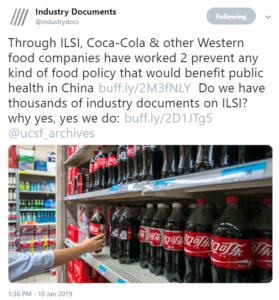Coca-Cola’s political influence in China: documented evidence
The BMJ (the new name for what was formerly the British Medical Journal) has just published a report by Susan Greenhalgh, an anthropologist and China specialist at Harvard, of how Coca-Cola, working through the International Life Sciences Institute (ILSI), got the Chinese government to focus its anti-obesity efforts on promoting physical activity rather than dietary changes.
Professor Greenhalgh documented industry influence on Chinese health policy through review of published work as well as interviews with key players in this drama.
- The BMJ Press Release
- Greenhalgh’s article—“Making China safe for Coke: how Coca-Cola shaped obesity science and policy in China“—(plus a podcast interview)
- An accompanying editorial by Martin McKee, Sarah Steele, and David Stuckler: “The Hidden Power of Corporations.”
A more thorough report of her investigation with details of her interviews was released at the same time by the Journal of Public Health Policy: “Soda industry influence on obesity science and policy in China.” This report comes with extensive supplemental information about her methods and interview details (these explain why training in anthropology is useful for this kind of work and provides information not otherwise available).
For readers familiar with Coca-Cola’s funding of the Global Energy Balance Network (GEBN), this is a familiar story.
I tell the GEBN story in a chapter in my recently released book, Unsavory Truth: How Food Companies Skew the Science of What We Eat.
One surprise in writing that book was how often ILSI turns up in its pages. ILSI positions itself as an independent “nonprofit, worldwide organization whose mission is to provide science that improves human health and well-being and safeguards the environment,” but it was founded by Coca-Cola and is largely supported by food and beverage companies. It works in many countries to promote food-industry interests.
Greenhalgh’s articles thoroughly expose how this organization accomplishes its objectives. If you would like to know more about it, UCSF Food Industry Documents Library can help, as I learned about from this tweet.

Greenhalgh’s investigation has received extensive press coverage.
I was particularly interested in the account by Crossfit’s Derek Fields and Russ Greene, which provides further documentation of the close connections between Chinese health agencies, ILSI, and programs funded by Coca-Cola.



Americans these days don’t want artificial and unsustainably produced ingredients in the food they buy and eat. For the makers of highly processed foods – ultraprocessed in today’s terminology – there isn’t a lot that they can do to make the products appear fresh and natural.
But Campbell’s is certainly trying. A few months after announcing that it will phase out genetically modified organisms (GMOs), the iconic soup company said on Friday that it will remove Bisphenol-A (BPA) from its cans by next year.
BPA, you will recall, is a chemical typically used in polycarbonate plastic containers and in the epoxy linings of food cans. It’s also an endocrine disrupter, which means it can interfere with the work our hormones are doing. Some research finds BPA to have effects on childhood development and reproduction.
Although the FDA doesn’t believe evidence of potential harm is sufficient to ban BPA from the food supply, the agency discourages use of BPA-polycarbonate or epoxy resins in baby bottles, sippy cups or packaging for infant formulas. For the past year or so, other retailers have been working hard to phase out BPA and to reassure customers that their cans and packages are safe.
All of these companies sell highly processed foods in an era when the public is demanding – and voting with their dollars – for fresh, natural, organic, locally grown and sustainably produced ingredients.
They can’t provide those things, but they can tout the bad, or unpopular, things that aren’t part of their product, the “no’s”: no unnatural additives, no artificial colors or flavors, no high fructose corn syrup, no trans fat, no gluten and, yes, no GMOs or BPA.
Let me add something about companies labeling their products GMO-free. In my view, the food biotechnology industry created this market – and greatly promoted the market for organics, which do not allow GMOs – by refusing to label which of its products contain GMOs and getting the FDA to go along with that decision. Whether or not GMOs are harmful, transparency in food marketing is hugely important to increasing segments of the public. People don’t trust the food industry to act in the public interest; transparency increases trust.
Vermont voted last year to mandate GMO labeling in the state – the US Senate rejected a bill in mid-March attempting to undermine it – and food conglomerates such as Campbell’s, General Mills, ConAgra, Kellogg and Mars have committed to labeling their products as containing GMO.
In addition to removing BPA from packaging and GMO from products, at least 11 other companies have announced recently that say they are phasing out as many artificial additives as possible, as quickly as they can.
Taco Bell, for example, will get rid of Yellow Dye #6, high fructose corn syrup, palm oil and artificial preservatives, and replace them with “natural” ingredients. Huge food companies such as Kraft, Nestlé (no relation) and General Mills are heading in the same direction.
All this may well benefit consumers to an extent. It also makes perfect sense from a business perspective: the “no’s” sell. But what everyone needs to remember is that foods labeled “free from” still have calories and may well contain excessive salt and sugars. The healthiest diets contain vegetables and lots of other relatively unprocessed foods. No amount of subtraction from highly processed foods is going to change that.